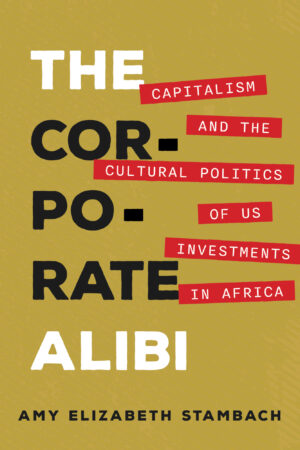When US Corporations Play Government: Notes from Africa
By Amy Elizabeth Stambach, author of The Corporate Alibi: Capitalism and the Cultural Politics of US Investments in Africa
At a dinner in England, a US investor leaned across the table and told me, almost gleefully: “Someday, we won’t even need governments; corporations will do everything.” That one sentence crystallized years of my research. Corporations are not simply economic engines. They are stepping into the roles of schools, clinics, and even local governments. They hand out gifts, sponsor projects, and present themselves as benevolent problem-solvers. But these “solutions” often serve as cover stories. They hide the harm that corporations create in the first place. I call this the corporate alibi.
Amazon’s recent expansion in South Africa captures this perfectly. With great fanfare, the company’s developer announced their new headquarters in Cape Town, promising jobs, innovation, and investment. Yet the site chosen for construction was on wetlands along the Liesbeek River, a fragile floodplain and land held sacred by local communities with deep historical ties to the area. Environmentalists warned the project would increase climate risks in a city already scarred by drought. Community leaders called it desecration. At the same time, Amazon proudly advertised its global sustainability pledges and community initiatives. On paper, it was a model corporate citizen. On the ground, it was something very different. That’s the alibi at work: philanthropy and green branding to distract from cultural and ecological costs.

Amazon’s story is not unique. Across the continent, corporations follow a similar playbook. Agribusiness firms control farmland. Pharmaceutical companies sponsor health campaigns that create markets for their products. Tech giants open “digital literacy” programs for students while outsourcing exploitative online labor. The pattern is older than it looks. Across history, powerful institutions have justified taking land, labor, and resources by framing it as a form of service or uplift. Colonial governments, empires, and later development agencies often used similar language. The language has changed, but the structure remains: extract resources, then justify that extraction by offering selective gifts.
It’s tempting to view Cape Town’s wetlands fight as a local issue. But what happens there affects us all. A few years ago, a US tech firm sent content moderation work to Nairobi. Workers earned less than $2 an hour to screen disturbing online material. Less than $2 an hour is not enough to live on in Nairobi. The company framed this as “poverty alleviation.” In reality, it was a way to cut costs and shift trauma onto others. Practices like these don’t just stay overseas. By lowering standards abroad, corporations normalize exploitation everywhere. The battles over water in Cape Town, farmland in Tanzania or South Africa, or online labor in Nairobi are part of the same global story.
As an anthropologist, I wrote The Corporate Alibi to show how global capital flows are not solely about markets—they are also about culture. The book brings ethnographic detail to corporate practices that are often viewed merely through an economic lens. Anthropology has a longstanding tradition of examining how people adapt to change and find meaning in the face of powerful institutions. My contribution extends this perspective to multinational corporations themselves. I explore their leaders’ speeches, their donors’ philanthropy, the rituals of self-presentation in their public relations offices, and the cultural logics that lead corporate leaders to perceive their organizations as akin to governments. In other words, the book doesn’t just critique corporations. It demonstrates how anthropology can reveal the hidden connections between corporate image-making and people’s everyday struggles for water, land, and dignity.
From decades of research, two lessons stand out. First, leaders within corporations are skilled at writing alibis. Amazon’s sustainability pledges, donations, and development partnerships are strategies of reputation management. That much is perhaps obvious. What is less so is my second point. Second: Even those who work inside corporations live with contradictions. In their jobs, they perform the corporate script—rolling out sustainability reports, cutting ribbons on new projects, and defending development plans. But outside their jobs, they too sometimes see what’s happening. Wetlands are paved over. Water runs short. Communities pay the price. People often carry both understandings at once. That gap between what they say at work and what they know in life is not trivial – it is where anthropology can help us see how alibis function and how ordinary awareness quietly keeps power in check.
I wrote The Corporate Alibi to shine a light on these stories. To ask: When a corporation donates bottled water, who drained the river in the first place? When a company builds a school computer lab, whose land was cleared to make room for the project?
The book is both a critique and an invitation. It asks readers to look beyond the polished narratives, to see what is left unsaid, and to imagine futures that don’t rely on corporate alibis. The investor at that dinner may have believed corporations would one day replace governments. My hope is simpler. That governments do their job, that corporations answer for the harm they cause, and that people and places no longer disappear behind corporate alibis.